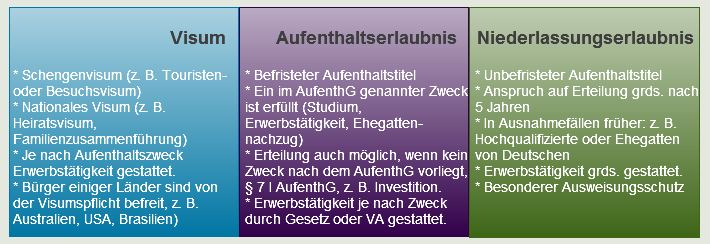Federal Constitutional Court, March 25, 2011, Case No.: 2 BvR 1413/10
Section 30 of the Act on the Residence, Economic Activity, and Integration of Foreigners in the Federal Territory (Residence Act – AufenthG) regulates the family reunification of spouses to foreign nationals.
According to Section 30, a spouse of a foreign national can generally apply for a residence permit if:
Both spouses have reached the age of 18
The spouse can communicate in German on a basic level
and if the foreign national holds one of the following:
An EU long-term residence permit
- Permanent residence-EC
A residence permit
owns.

The requirement stipulated in Section 30 (1) No. 2, that the spouse must be able to communicate in German at least on a basic level, is repeatedly the subject of judicial disputes and political discussions.
The General Administrative Regulation 30 to Section 30 of the Residence Act defines the necessary language skills in 30.1.2.1 as follows: “Can understand and use familiar, everyday expressions and very simple sentences aimed at meeting specific needs. Can introduce themselves and others and can ask and answer questions about personal details, such as where they live, people they know, or things they have. Can communicate in a simple manner if the conversation partners speak slowly and clearly and are willing to help.”
The above-mentioned decision of the Federal Constitutional Court addressed the constitutionality of Section 30 (1) No. 2 of the Residence Act.
The complainants in this case were Turkish nationals who felt their fundamental rights under Article 6 (1) (protection of marriage and family), (2) Basic Law (GG) (free development of personality), Article 3 GG (equality principle), and Article 8 of the European Convention on Human Rights (ECHR) (right to respect for private and family life) were violated due to the rejection of family reunification.
Facts
The first complainant was the mother of the complainants 2 to 6. She applied for a residence permit based on Section 30 (1) of the Residence Act (AufenthG). Being illiterate, she was unable to provide the language certification required under Section 30 (1) No. 2 AufenthG. The application was rejected by the competent authority.
Decisions of the Administrative Courts
The administrative court first called upon, and subsequently the Federal Administrative Court, confirmed the authority’s decision. In its ruling (BVerwGE 136, 231), the Federal Administrative Court deemed the rejection of the application by the authority to be lawful.
Constitutional Complaint by the Complainant
The complainant subsequently filed a constitutional complaint with the Federal Constitutional Court. She argued that her fundamental rights under Article 6 (1) and (2) of the Basic Law (GG), as well as Article 3 GG and Article 8 of the European Convention on Human Rights (ECHR), were violated. In particular, she criticized the required language certification as unconstitutional, arguing that it was neither effective in combating forced marriages nor in integrating the affected foreigners. She also argued that the required language skills were insufficient to achieve the legislative objectives.
Decision of the Federal Constitutional Court
The Federal Constitutional Court did not accept the constitutional complaint for decision. The second chamber of the 2nd Senate declared Section 30 (1) Sentence 1 No. 2 AufenthG to be constitutional. The decision not to accept the complaint was justified by the fact that the constitutional questions had already been clarified by the Federal Constitutional Court’s jurisprudence (cf. BVerfGE 76, 1; 80, 81; BVerfGK 13, 26). The challenged decisions concretized the established principles for proving German language skills according to Section 30 (1) Sentence 1 No. 2 AufenthG in a legally unobjectionable manner.
Source: Federal Constitutional Court
Important Note: The content of this article has been prepared to the best of our knowledge and belief. However, due to the complexity and constant evolution of the subject matter, we must exclude liability and warranty. Important Notice: The content of this article has been created to the best of our knowledge and understanding. However, due to the complexity and constant changes in the subject matter, we must exclude any liability and warranty.
If you need legal advice, feel free to call us at 0221 – 80187670 or email us at info@mth-partner.de.


One Response